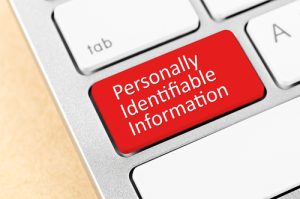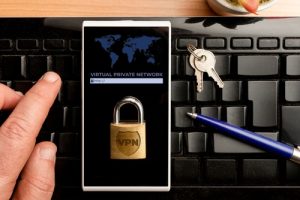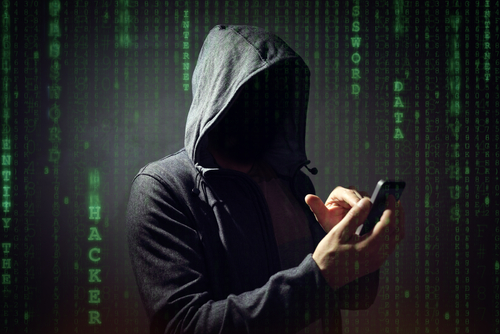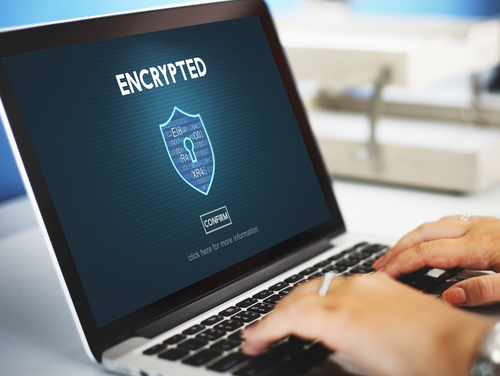You want to protect your Personally Identifiable Information (PII), but what constitutes PII? Is an email address PII? Yes, as outlined by the US Department of Labor, email addresses count as personally identifiable information.
Read on to find out more information about why your email address is considered PII and how you can protect this information.

What is PII?
Personally identifiable information is any information that allows someone to infer the identity of an individual to whom the information applies. According to the U.S. Department of Labor (DOL), PII is information that meets the following criteria:
- It directly identifies an individual
- It is information that an agency can use to identify specific individuals
- It is also information that allows someone to contact you either online or in person
PII can be stored as paper, electronic, or other media. The following items are personally identifiable information:
- Social Security Numbers (SSN)
- Address
- Date of birth
- Email address
- Phone number
People use PII to identify themselves to governments. They also use them to enable transactions with banks, creditors, and businesses. However, PII has a wide range of uses in your everyday life from picking up medication at the pharmacy to shipping packages.
In the wrong hands, PII can allow criminals to steal your identity, and your money, and damage your financial reputation.
What Can People Do With Your Email Address?
Some personally identifiable information is considered public knowledge, and thus, it is non-sensitive PII. Other information, such as your passwords or banking account numbers, is sensitive information.
Your email address is a non-sensitive PII. People can easily type your name into a search engine to find out this information. But, just because the information is public doesn’t mean it can’t be problematic in the wrong hands.
A cybercriminal with your email address can bombard your email account with phishing emails, sign you up for accounts using your email address, and crack your passwords.
Phishing Emails
Phishing emails are the cause of 32% of data breaches and 78% of cyber-espionage incidents. A scammer sends a phishing email posing as a trusted company or contact. They make the message sound urgent and request some sort of password reset or account recovery.
Within their often short message, there is usually a link that will lead you to a fake website. The website will prompt you to input your password and username, effectively giving the criminal your account login information.
However, phishing emails have become increasingly adaptive and may vary. Still, they are one of the leading causes of identity theft and financial loss.
Fake Accounts
With your email address, a cybercriminal can sign up for accounts online, racking up a bill that is traced back to you. When the bill defaults, your name will be associated with the account, causing you a headache, and possible financial responsibility, and may affect your credit score.
They can also sign you up for a lot of newsletters or other online marketing campaigns that can spam your inbox. If you click on some of these emails, the company or third parties may have the ability to track you online.
Crack Your Password
Once a cybercriminal has your email address, it becomes a lot easier to access your accounts. All they need to do is crack your password. If your password has been in a data breach, it could be floating around on the dark web for anyone to purchase.
Then, a hacker could sign into your email account and impersonate you. If you have a weak or easy-to-guess password, they could simply use a brute-force attack to gain access to your email. Once in your email, they would have access to a lot of personal data.
Some stored emails may even have credit card account numbers, password and username information, and a litany of other PII that would make it easy for a hacker to steal your money and identity.
Trick Your Family and Friends
A scammer can also use your email address to scam your family and friends. If they have access to your email account, they can send emails from it and trick your contact list into falling from their phishing scams.
They can also just use your email address without hacking into your account to fool your friends and family. They may create an email address that mimics yours to send out phishing emails. Since your contacts will know your email address, they may fall prey to these scams if they don’t carefully read the domain name.
This can lead to the people you know and love getting scammed by cybercriminals.
Impersonate You
If a hacker gains your email address, they may be able to get companies to reset passwords and give them access to your accounts. Some tech support options for companies aren’t as thorough as they could be, and if someone calls in claiming that they’ve been locked out of their accounts, sometimes an email address is all they need to unlock the account.
Once they gain access to the account, they can start spending money or stealing additional data to further steal your identity.
Hack Your Social Media
Many social media sites use email addresses to log in. If a scammer has your email address, they may be able to gain access to your social media accounts. They can send out phishing links and post inaccurate information on your social media accounts, leading to your family and friends getting tricked.
With features like using your Facebook account to sign into other accounts, a hacker can gain access to several of your other accounts by breaking into your social media account. Many social media accounts also have financial information or payment options that scammers can exploit.
Cybercriminals are clever and their tactics can end up damaging your credit permanently or costing you thousands to restore your accounts.
How Can You Protect Your Email Address?
Since your email address is public information, you need to be extra vigilant about how you conduct yourself online to keep your information safe from cybercriminals.
There are ways you can work to keep a private email address, even in today’s society where companies ask for your email address at every turn. Try out some of these strategies to keep your email address safe from hackers.
Email Relay Services
You can use an email relay service to help keep your email address private. Essentially, this service generates a virtual email address that you can provide to apps and websites. When these companies send emails to that address, those messages will automatically be forwarded to your real inbox.
These email relay services usually allow you to create and manage multiple aliases. So, you can give out different aliases to different types of organizations to organize your emails. You can even configure the settings on these aliases to send all the emails from a certain email to folders in your inbox.
So, you can send all your newsletters to the spam folder or trash without having to delete them manually. Also, if you have an email service that allows you unlimited aliases, you could generate a new alias for every entity that asks for your email address.
This would protect your email address from floating around so publicly on the web. If you are an Apple user, you may have a way to hide your email address already. iCloud+ users have access to a feature called “Hide My Email,” which can keep your personal email address private.
This feature generates unique, random email addresses for you to give out when you have to fill out paperwork. These email addresses automatically forward to your private email.

VPNs
Another way to keep your email address private is by using a Virtual Private Network (VPN). Once you connect to a VPN, your internet traffic is directed through an encrypted tunnel. Your IP address is obscured, making it harder for hackers to trace your IP address back to PII, like your email address.
When you connect to a VPN, all your internet traffic will appear to originate from the location of the server. VPN servers can be located all over the world, and several users are on these servers at once. This masks your IP address and makes it harder to trace.
When checking your email, you can use a VPN to keep hackers from intercepting to find out your PII. Many VPN providers also have email features you can use that will help you maximize your privacy.
Create a Separate Email
Another way to fight the constant demand for your email address is to create a burner account on another email domain that you give out to companies and websites. This account would be your public email address, but you could keep your real email address private.
You can often set up email accounts on the same domain or a separate domain that would forward all your mail from one inbox to the other. So, you could have all your mail routed to your actual email. Or, you could keep your emails in that account, check it occasionally, and manage it that way.
Keeping your separate email on the same domain may leave your email address more vulnerable. Email clients would have your information from both accounts and would be able to link you with other information like your phone number or name.
When you sign up for a separate email account, consider looking for an email client that allows you to sign up with a minimum PII. This way, if you need to send an email through this domain, you can send the email anonymously.
Remember that the header of an email will list your email address, so if you want to send an email without giving the recipient your actual address, you can use this separate email address to send the message.
If this email address becomes compromised, it will be much easier to stop using it and start another.
Create A Burner Account
Another way to keep your private email address secret is to create a burner account.
This is a temporary email address that you would give out to companies or desired recipients for a short time. When you are done with your correspondence, you can abandon the account and start another.
You can even find temporary email address providers online that will allow you to use that email address to sign up for accounts, verify these addresses, and then the account will be deleted. These temporary inboxes may be public and they don’t allow you to send emails out, but they are a great solution for being able to sign up for products and accounts without needing to give out your private email information.
How Sekur Can Keep Your Email Address Safe
Sekur offers encrypted, Swiss-protected email, VPN, and instant messaging. If you are looking to obscure your email address, our suite of products will help you create a secure, encrypted connection between your device and the internet.
As you send data, it will be hidden from prying eyes. Since the server is located in Switzerland, you will be protected by the world’s strongest privacy laws. Our high-speed servers allow unlimited data.
Sekur VPN is easy to use. A single license works for all your devices. We use our proprietary technology to encrypt your traffic end-to-end, giving you the highest level of protection on the internet.
Also, we offer SekurMail, which offers full control over how and when recipients read your email. Your messages never leave our secure systems and you can set a Self Destruct timer and read limits for individual emails.
To regain your privacy, try out Sekur.
Conclusion
Email addresses are personally identifiable information. There are several ways that hackers can use your email address to steal your identity and ruin your reputation online. So, if you want to keep your email address out of the wrong hands, there are a few ways to keep your email address hidden.
These strategies will help you to better protect your PII and keep you safe from cyberattacks.

